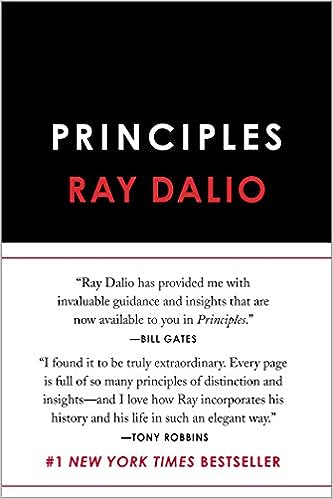Welcome to Thinkers Books, a platform dedicated to sharing enlightening insights from the world of literature. Today, we invite you on a journey through an extraordinary book that’s more than just a read; it’s a life-changing guide. The text in focus is ‘Principles’ by Ray Dalio, a thought-provoking piece that has sparked debates worldwide.
Ray Dalio, the founder of Bridgewater Associates, one of the world’s most successful hedge funds, is the mastermind behind this masterpiece. His book, ‘Principles,’ is a compilation of profound wisdom from his extensive career and personal experiences.
At the heart of ‘Principles’ are Dalio’s unique philosophies on life and work encapsulated in principles. The book is divided into two parts: Life Principles and Work Principles. Each section offers specific insights and practical techniques applicable to daily life and professional endeavours.
In the Life Principles section, Dalio underscores the importance of radical truth and transparency, which he views as pillars of meaningful relationships and effective decision-making. He introduces ‘believability-weighted decision making,’ a concept where the credibility of the people involved drives decisions.
The Work Principles section presents a blueprint for cultivating a culture of excellence. Dalio introduces his innovative idea-meritocracy system, promoting the best ideas, irrespective of origin. He also highlights the significance of understanding people’s unique values and abilities and aligning them with the right roles.
Here are the top five learning points from ‘Principles’:
- Embrace Reality and Deal with It: Dalio emphasises the importance of facing reality and dealing with it effectively, no matter how harsh it may be. This involves acknowledging and accepting facts not as we would like them. By embracing reality, we can make better decisions and devise truth-based strategies.
- Use the 5-Step Process to Achieve Your Goals: Dalio shares a 5-step process to achieve goals: have clear goals, identify and don’t tolerate problems, diagnose them to get at their root causes, design plans to overcome the difficulties, and execute these designs. This process can be applied to any area of life, personal or professional, and can guide you towards success.
- Understand that People are Wired Differently: Recognizing that each individual is unique and has strengths and weaknesses is vital, according to Dalio. He advocates for understanding and appreciating these differences, leading to better collaboration and more effective teams.
- Learn How to Make Decisions Effectively: In ‘Principles’, Dalio provides insight into his decision-making process. He encourages collecting a wide range of viewpoints, having an open mind, and using a systematic approach. This method, which he calls “believability-weighted decision-making,” leads to more balanced and informed decisions.
- Constantly Learn and Improve: Dalio believes in continuous learning and improvement. He sees mistakes as opportunities to learn, grow, and improve. His principle of “pain + reflection = progress” encapsulates this idea.
‘Principles’ is a game-changer in leadership, management, and personal development literature. Its most notable strength is its practicality. Dalio provides straightforward, actionable steps for readers to improve their lives and organisations.
On a personal note, ‘Principles’ has profoundly impacted how I tackle challenges and make decisions. Dalio’s ‘Pain + Reflection = Progress’ philosophy has empowered me to transform setbacks into stepping stones towards success.
As we conclude this exploration of ‘Principles,’ we invite you to share your thoughts on the book. How have Dalio’s philosophies influenced your life or work? Your insights will undoubtedly enrich our collective understanding of this profound philosophy.
We at Thinkers Books encourage you to continue seeking knowledge through our curated collection of book summaries. As Dalio himself says, “Whatever success I’ve had in life hasn’t been because I’ve been smart; it’s because I’ve iterated. Failure is part of the process of success.” So, keep learning, keep growing, and keep iterating. Until next time, stay curious and keep thinking.







